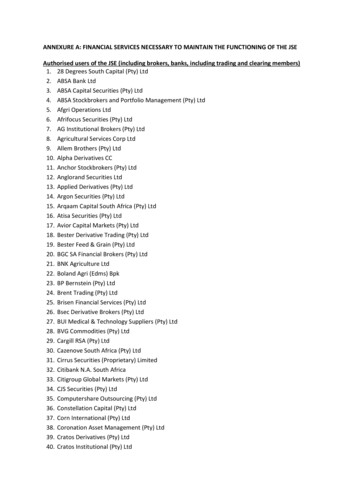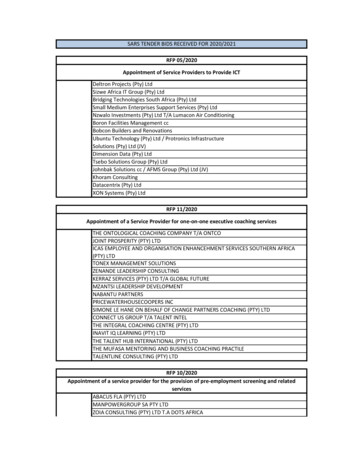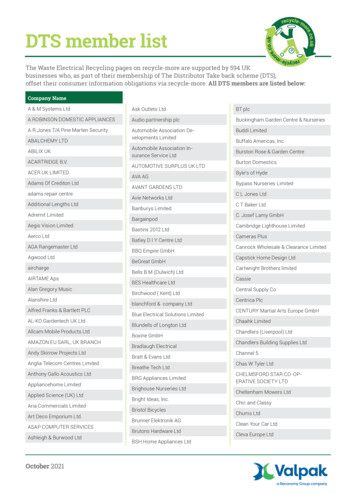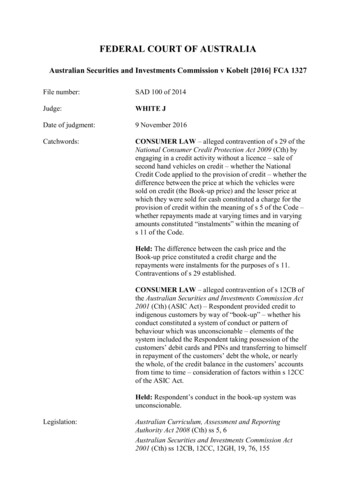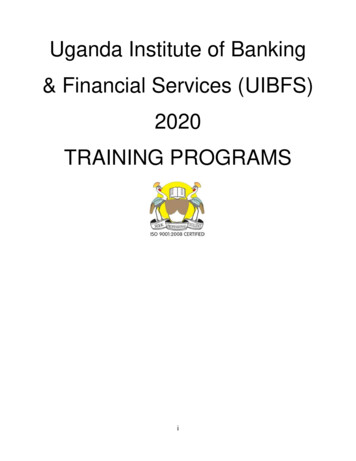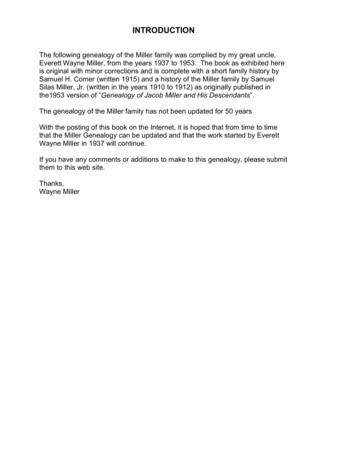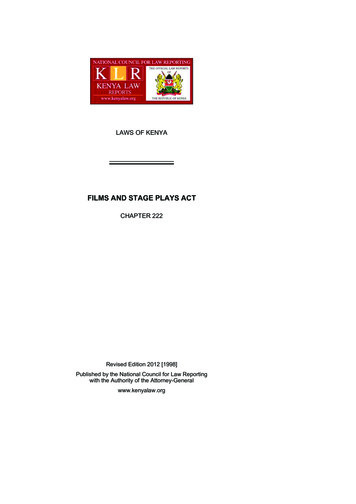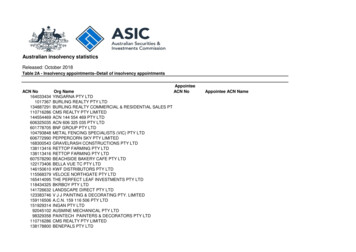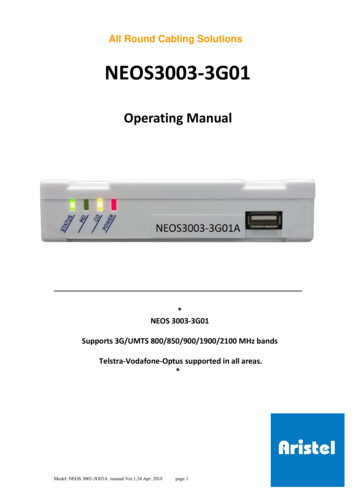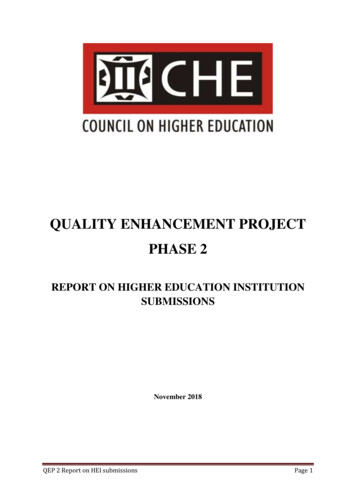
Transcription
Warner Bros Feature Productions Pty Ltd v KennedyMiller Mitchell Films Pty 1e4d9Court of AppealSupreme CourtNew South WalesSummary availableAmendment notesMedium Neutral Citation:Warner Bros Feature Productions Pty Ltd v Kennedy Miller Mitchell FilmsPty Ltd [2018] NSWCA 81Hearing dates:14 February 2018Date of orders:24 April 2018Decision date:24 April 2018Before:1/28
Bathurst CJ at [1]; Beazley P at [93]; Emmett AJA at [94]Decision:(1) Grant the applicants leave to appeal.(2) Allow the appeal.(3) Set aside the orders made by the primary judge.(4) Direct the parties to make submissions within 7 days as to the appropriate orders togive effect to this judgment.(5) Order the respondents to pay the applicants’ costs of the appeal and the costs of themotion for a stay in the Court below.Catchwords:CONTRACTS – Express terms – Incorporation of terms – Incorporation by reference –agreement stated that balance of terms would be “WB standard for ‘A’ list directors andproducers” subject to “good faith negotiations” – whether terms were incorporated beforegood faith negotiations had taken place – whether terms which were “standard” had beenproved to existCOMMERCIAL ARBITRATION – Arbitration agreement – Form of arbitrationagreement – Arbitration clause - agreement stated that balance of terms would be “WBstandard for ‘A’ list directors and producers” – whether an arbitration clause was “WBstandard for ‘A’ list directors and producers”Legislation Cited:Commercial Arbitration Act 2010 (NSW)International Arbitration Act 1974 (Cth)Cases Cited:Baulkham Hills Private Hospital Pty Ltd v GR Securities Pty Ltd (1986) 40 NSWLR 622Council of the Upper Hunter County District v Australian Chilling and Freezing Co Ltd(1968) 118 CLR 429; [1968] HCA 8Ecosse Property Holdings Pty Ltd v Gee Dee Nominees Pty Ltd (2017) 91 ALJR 486;[2017] HCA 12Electricity Generation Corporation v Woodside Energy Ltd (2014) 251 CLR 640; [2014]HCA 7GR Securities Pty Ltd v Baulkham Hills Private Hospital Pty Ltd (1986) 40 NSWLR 631Lief Investments Pty Ltd v Conagra International Fertiliser Co (Court of Appeal (NSW), 16July 1998, unrep)2/28
Mount Bruce Mining Pty Ltd v Wright Prospecting Pty Ltd (2015) 256 CLR 104; [2015]HCA 37Schellenberg v Tunnel Holdings Pty Ltd (2000) 200 CLR 121; [2000] HCA 18Segelov v Ernst & Young Services Pty Ltd (2015) 89 NSWLR 431; [2015] NSWCA 156Sinclair Scott & Co Ltd v Naughton (1929) 43 CLR 310; [1929] HCA 34Toll (FGCT) Pty Ltd v Alphapharm Pty Ltd (2004) 219 CLR 165; [2004] HCA 52Category:Principal judgmentParties:Warners Bros Feature Productions Pty Ltd (first applicant)Warner Bros Entertainment Inc (second applicant)Kennedy Miller Mitchell Films Pty Ltd (first respondent)Kennedy Miller Mitchell Services Pty Ltd (second respondent)Representation:Counsel:A Bell SC with S Free and M Baroni (applicants)C Withers with A Hochroth (respondents)Solicitors:Gilbert Tobin (applicants)Simpsons Solicitors (respondents)File Number(s):2017/361726Publication restriction:NilDecision under appealCourt or tribunal:Supreme Court of New South WalesJurisdiction:EquityCitation:[2017] NSWSC 1526Date of Decision:09 November 2017Before:Hammerschlag JFile Number(s):2017/2684503/28
[Note: The Uniform Civil Procedure Rules 2005 provide (Rule 36.11) that unless theCourt otherwise orders, a judgment or order is taken to be entered when it is recorded inthe Court's computerised court record system. Setting aside and variation of judgmentsor orders is dealt with by Rules 36.15, 36.16, 36.17 and 36.18. Parties should inparticular note the time limit of fourteen days in Rule 36.16.]HEADNOTE[This headnote is not to be read as part of the judgment]In 2009, Kennedy Miller Mitchell Films Pty Ltd (KMMF) and Kennedy Miller MitchellServices Pty Ltd (KMMS) entered into an agreement with Warner Bros FeatureProductions Pty Ltd (WB Productions) to supply the services of Mr George Miller and MrDoug Mitchell for the production and direction of a film entitled Mad Max: Fury Road(the Letter Agreement). The Letter Agreement was amended several times, most recentlyin 2012.Under the Letter Agreement as amended, KMMF and KMMS were entitled to a bonuspayment and other benefits if the “net cost” of the film was below an agreed figure. Adispute arose as to whether certain costs ought to be included in the calculation of the“net cost” for the purpose of determining whether KMMF and KMMS were entitled to thebonus payment and other benefits under the Letter Agreement.KMMF and KMMS brought proceedings against WB Productions in the Supreme Court ofNew South Wales. They claimed that WB Productions breached the Letter Agreement byfailing to make the bonus payment and by preventing KMMF and KMMS from seeking aco-financier for the film. Warner Bros Entertainment Inc (WB Entertainment), the parentof WB Productions, was said to have induced the latter breach. They also claimed that WBProductions and WB Entertainment engaged in misleading and deceptive conduct inrelation to which costs would be included in the calculation of the “net cost”.WB Productions sought a stay of the proceedings on the ground that the Letter Agreementincluded a term requiring the dispute to be submitted to arbitration in California. Itclaimed that the term was incorporated into the Letter Agreement by cl 21, whichprovided that the “balance of terms” would be “WB standard for ‘A’ list directors andproducers”, subject to “good faith negotiations”. WB Entertainment sought a stay on theground that New South Wales was a clearly inappropriate forum since the claim against itwas closely related to the claim against WB Productions.The primary judge dismissed the application for a stay. He held that cl 21 operated toincorporate terms into the Letter Agreement prior to good faith negotiations occurring.However, he found that WB Productions, as distinct from other members of the WarnerBros group, did not have any terms which were “standard” which were incorporated.Further, even if it was relevant that other members of the Warner Bros group had “form4/28
agreements” with terms requiring disputes to be submitted to arbitration in California, hefound that WB Productions had not provided sufficient evidence to prove that these termswere “standard”.The principal issues on appeal were:1 Whether the Letter Agreement incorporated terms which were “WB standard for ‘A’ listdirectors and producers” prior to good faith negotiations occurring; and2 Whether an arbitration clause was incorporated into the Letter Agreement because itwas a term which was “WB standard for ‘A’ list directors and producers”.Incorporation of terms prior to good faith negotiations(i) Clause 21 of the Letter Agreement incorporated terms which were “WB standard for‘A’ list directors and producers” prior to good faith negotiations occurring. Thisconstruction of the clause was supported by the text of the clause read in the context ofthe Letter Agreement as a whole. In particular, several important terms of the LetterAgreement could not operate unless such terms were incorporated immediately: [56]-[61](Bathurst CJ); [93] (Beazley P); [104] (Emmett AJA).Incorporation of terms which were “WB standard for ‘A’ list directors and producers”(ii) The primary judge erred in holding that terms could only be “WB standard for ‘A’ listdirectors and producers” if they were “standard” for WB Productions. The phrase waswide enough to include terms which were “standard” for other companies in the WarnerBros group: [79] (Bathurst CJ); [93] (Beazley P); [104] (Emmett AJA).(iii) The primary judge erred in holding that terms could only be “WB standard for ‘A’ listdirectors and producers” if they were included in a “sufficient preponderance” ofagreements to make their use “usual”. The phrase referred to terms which were habituallyproffered by companies in the Warner Bros group for agreements with “A” list directorsand producers: [82] (Bathurst CJ); [93] (Beazley P); [104] (Emmett AJA).(iv) Clause 21 of the Letter Agreement incorporated an arbitration clause which wascontained in “form agreements” held by a division of a subsidiary of WB Entertainment.The evidence established that this clause had been used since the early 2000s and wasincluded in the “form agreements” which were current at the time the Letter Agreementwas made: [83] (Bathurst CJ); [93] (Beazley P); [104] (Emmett AJA).Judgment5/28
1. BATHURST CJ: This is an application for leave to appeal from a decision of ajudge of the Supreme Court of New South Wales dismissing an application broughtby the applicants, Warner Bros Feature Productions Pty Ltd (WB Productions) andWarner Bros Entertainment Inc (WB Entertainment), for a stay of proceedingsbrought against them in the Commercial List of the Equity Division of the SupremeCourt by the respondents, Kennedy Miller Mitchell Films Pty Ltd (KMMF) andKennedy Miller Mitchell Services Pty Ltd (KMMS).The proceedings2. The proceedings brought against WB Productions and WB Entertainment by KMMFand KMMS in the Commercial List involved a dispute arising out of an agreement(the Letter Agreement) between WB Productions, KMMF and KMMS relating to thesupply of the services of Mr George Miller and Mr Doug Mitchell for the productionand direction of a film entitled Mad Max: Fury Road (the Film). Mr Miller and MrMitchell were each directors of both KMMF and KMMS.3. The document containing the terms of the Letter Agreement was expressed to be “asof” 12 February 2009. The Letter Agreement was amended on three occasions. Eachamendment was also expressed to be “as of” a certain date. The first amendmentwas “as of” 20 August 2009. The second amendment was “as of” 4 January 2012.The third amendment was “as of” 6 June 2012.4. It will be necessary to set out the terms of the Letter Agreement in a little moredetail subsequently in this judgment. However, for present purposes, it is sufficientto note that the Letter Agreement, as amended, provided that KMMF and KMMSwere “entitled to an additional sum” of 7 million, amongst other benefits, if theyproduced the Film for a “net cost” of 157 million or less. In calculating the “netcost” of the Film, the Letter Agreement excluded costs arising from “new or changedscenes” or “changes in the approved schedule” requested by WB Productions.5. In the proceedings brought by KMMF and KMMS, they claim that, contrary to theLetter Agreement, certain costs which should have been excluded were wronglyincluded in the calculation of the “net costs” of the Film, thereby denying them thebonus of 7 million and other benefits under the Letter Agreement. Therefore, theyclaim against WB Productions for breaching the Letter Agreement by failing to paythe bonus of 7 million and the other benefits under the Letter Agreement. In thealternative, KMMF and KMMS claim that each of WB Productions and WBEntertainment engaged in misleading and deceptive conduct in failing to informthem that WB Productions and WB Entertainment did not consider the costs inquestion to be excluded costs under the Letter Agreement.6. KMMF and KMMS also claim that WB Productions breached a provision in theLetter Agreement which required WB Productions to offer KMMF and KMMS thefirst opportunity to provide co-financing if WB Productions intended to seek a cofinancier for the Film other than two nominated co-financiers. KMMF and KMMSclaim that WB Entertainment induced that breach.6/28
7. WB Productions sought a stay of the proceedings, relying on a clause requiringdisputes “arising out of” or “related to” the Letter Agreement to be submitted toarbitration in California by a body known as JAMS. The arbitration clause reliedupon by WB Productions was said to have been incorporated into the LetterAgreement by cl 21, which provided that the “balance of terms” in the LetterAgreement would be “WB and WB standard for ‘A’ list directors and producers”. WBProductions therefore submitted that it was entitled to a stay of proceedings unders 7(2) of the International Arbitration Act 1974 (Cth) or s 8 of the CommercialArbitration Act 2010 (NSW). Alternatively, WB Productions relied on an arbitrationclause to similar effect contained in two agreements; each entitled “Certificate ofEmployment (Loanout)”. One agreement was executed by WB Productions, KMMFand Mr Miller, and the other was executed by WB Productions, KMMF and MrMitchell (the COEs).8. WB Entertainment was not a party to either the Letter Agreement or the COEs.However, it sought a stay of proceedings on the ground that New South Wales was aclearly inappropriate forum since the claim against it was clearly related to the claimagainst WB Productions, which was subject to an arbitration clause. In thealternative, it submitted that a temporary stay was appropriate pending the outcomeof the arbitration between WB Productions and KMMF and KMMS.9. The primary judge held that cl 21 was effective to incorporate terms which could bedescribed as “WB and WB standard for ‘A’ List directors and producers” into theLetter Agreement. However, he considered that WB Productions had not establishedthat the arbitration clause which it relied upon was its “standard” or the “standard”of its parent, Warner Bros Studio Enterprises Inc. He also held that the disputewhich was the subject of the proceedings was not covered by the arbitration clausein the COEs. Accordingly, he refused the stays sought by WB Productions and WBEntertainment.10. WB Productions and WB Entertainment have sought leave to appeal from thisdecision. They contend that the terms incorporated into the Letter Agreement bycl 21 included an arbitration clause, or alternatively, that the dispute was covered bythe arbitration clause in the COEs.11. By a draft notice of contention, KMMF and KMMS contend that cl 21 did notoperate of its own force to incorporate any terms into the Letter Agreement, butrather, that it only imposed an obligation to negotiate in good faith with a view tothe inclusion of further terms.12. The application for leave to appeal was heard concurrently with argument on theappeal.The Letter Agreement7/28
13. The Letter Agreement is contained in a letter from Ms Sandra Smokler, aCalifornian attorney who was the Deputy General Counsel of a division of WarnerBros Studio Enterprises Inc, addressed to Mr Harold Brown, a Californian attorneyof the firm Gang Tyre Ramer & Brown who represented KMMF and KMMS innegotiations leading to the Letter Agreement, and Mr Bryan Lourd and Mr GlenMeredith of the Creative Artists Agency, who also represented KMMF and KMMS.The letter states that it confirms an agreement between WB Productions, defined as“WB”, and KMMF and KMMS, individually and collectively defined as “KMM”.14. Clause 2 of the Letter Agreement provides that, upon satisfaction of “WB’s reviewand approval of the chain-of-title with respect to” the Film, and the execution of anassignment of copyright, the Letter Agreement and the COEs, “WB will pay KMM for all rights in the Existing Material and for all additional writing services, if any,rendered on” the Film. The “Existing Material” comprised a screenplay and“detailed storyboards with captions” for the Film.15. The assignment of copyright which was a precondition of the Letter Agreement wasan assignment by Mr Miller and Mr Mitchell of copyright in the services provided bythem to WB Productions and in the work resulting from the provision of suchservices. It also contained some warranties and indemnities which are not relevantto these proceedings.16. Clause 3 of the Letter Agreement provides for the payment of “compensation” toKMMF and KMMS in exchange for the services of Mr Miller and Mr Mitchell inrelation to the Film. Three of the integers used in the formula to calculate theamount of the payment are “Defined Gross”, “Merchandising revenues” and“Soundtrack revenues”. So far as relevant, these terms are defined as follows:“Defined Gross and all escalations referred to in this Paragraph shall be computed,determined and payable in accordance with and subject to the provisions of WB’sstandard participation definitions, as modified by WB’s ‘A’ level rider except with a[REDACTED]% video royalty in lieu of [REDACTED]%.Merchandising revenues (other than videogame revenues) shall be included in DefinedGross in accordance with WB’s standard definition, as modified by WB’s ‘A’ level rider Soundtrack revenues shall be included in Defined Gross in accordance with WB’sstandard definition, as modified by WB’s ‘A’ level rider.”17. Clause 4 of the Letter Agreement provides for the adjustment of the “compensation”payable if the costs of production of the picture exceed the agreed budget. Certaincosts described as “Excluded Costs” are excluded from the calculations. So far as it isrelevant, cl 4(b)(ii) is in the following terms:“(b) The following (the ‘Excluded Costs’) shall be excluded from the overbudgetcalculation.8/28
(ii) Costs incurred or delays caused as a result of new or changed scenes added, orchanges in the approved schedule made, at the written request of an officer of WB havingthe rank of Vice-President or higher, and costs designated in writing as approved overagesby an officer of WB having the rank of Vice-President or higher.”18. Clause 7 of the Letter Agreement deals with producing credit, directing credit andcertain other credits. In relation to producing credit and directing credit, this clausemakes the following provision:“(a) Producing Credit: Miller and Mitchell shall be accorded first and second position‘Produced By’ credits, respectively, on screen on a separate card (shared only with eachother) and, subject to WB’s customary exclusions, in paid ads. (c) Directing Credit: Miller shall be accorded a ‘Directed By’ credit on screen and, subjectto WB’s customary exclusions, in paid ads.”19. Other credits dealt with in cl 7 refer to “WB’s customary exclusions” in similarterms.20. Clause 12 of the Letter Agreement deals with termination rights, including on thedeath or disability of Mr Miller or Mr Mitchell, or on breach by KMMF or KMMS.These rights are expressed to be “the same as WB’s customary termination rights for‘A’ level directors and producers”.21. Clause 21 of the Letter Agreement is in the following terms:“BALANCE OF TERMS:The balance of terms will be WB and WB standard for ‘A’ list directors and producers,subject to good faith negotiations within WB’s and WB’s customary parameters.”22. The parties to this appeal proceeded on the basis that the repetition of “WB” and“WB’s” in this clause was inadvertent, and that the relevant parts of the clauseshould be read as simply referring to “WB standard” rather than “WB and WBstandard”, and “WB’s customary parameters” rather than “WB’s and WB’scustomary parameters”.23. The COE relating to Mr Miller contained an acknowledgement by KMMF that WBProductions had engaged it to furnish the services of Mr Miller in connection withthe Film, and that the “results and proceeds” of the services he rendered and therights in those results and proceeds should be the property of WB Productions.Provision is made for what is said to be “equitable remuneration” for such rights.Relevantly, for present purposes, the COE contained an arbitration clause in thefollowing terms:9/28
“Any and all controversies, claims or disputes arising out of or related to this agreementor the interpretation, performance or breach thereof, including, but not limited to, allegedviolations of state or federal statutory or common law rights or duties, and thedetermination of the scope or applicability of this agreement to arbitrate (‘Dispute’),except as otherwise set forth below, shall be resolved according to the followingprocedures which shall constitute the sole dispute resolution mechanism hereunder. Inthe event that the parties are unable to resolve any Dispute informally, then such Disputeshall be submitted to final and binding arbitration. The arbitration shall be initiated andconducted according to either the JAMS Streamlined (for claims under 250,000) or theJAMS Comprehensive (for claims over 250,000) Arbitration Rules and Procedures,except as modified herein, including the Optional Appeal Procedure, at the Los Angelesoffice of JAMS, or its successor (‘JAMS’) in effect at the time the request for arbitration ismade (the ‘Arbitration Rules’). The arbitration shall be conducted in Los Angeles Countybefore a single neutral arbitrator appointed in accordance with the Arbitration Rules. Thearbitrator shall follow California law and the Federal Rules of Evidence in adjudicatingthe Dispute. The parties waive the right to seek punitive damages and the arbitrator shallhave no authority to award such damages.The arbitrator will provide a dated and signed detailed written statement of decisionincluding findings of fact and conclusions of law, which will be part of the arbitrationaward and admissible in any judicial proceeding to confirm, correct or vacate the award.Unless the parties agree otherwise, the neutral arbitrator and the members of any appealpanel shall be former or retired judges or justices of any California state or federal courtwith experience in matters involving the entertainment industry. If either party refuses toperform any or all of its obligations under the final arbitration award (following appeal, ifapplicable) within thirty (30) days of such award being rendered, then the other partymay enforce the final award in any court of competent jurisdiction in Los Angeles County.The party seeking enforcement of any arbitration award shall be entitled to an award of allcosts, fees and expenses, including attorneys’ fees, incurred in enforcing the award, to bepaid by the party against whom enforcement is ordered.”24. The COE relating to Mr Mitchell is in similar terms to the COE relating to Mr Millerand includes the same arbitration clause.The evidence of standard terms25. The evidence in support of the proposition that an arbitration clause was a “WBstandard term for ‘A’ list directors and producers” for the purpose of cl 21 of theLetter Agreement came from an affidavit of Mr Richard Levin, the Senior VicePresident and General Counsel of Warner Bros Pictures (WB Pictures), which hestated was a division of Warner Bros Studio Enterprises Inc. He stated that he wasalso an “authorised signatory” for WB Productions, which he described as “anAustralian entity formed for the purposes of producing motion pictures in Australiaand which is under the control of WB Pictures”. He stated that WB Pictures and WBProductions were both subsidiaries of WB Entertainment.10/28
26. Mr Levin stated that Ms Smokler, who reported directly to him, was “the attorneyprincipally in charge of preparing and negotiating the various talent agreementsrelating to” the Film. He stated that most talent agreements commenced with a“deal memo” prepared by a business affairs executive which summarised the “majordeal points”. He said that such memos were “ordinarily directed to my department”and that one of the lawyers who reported to him would prepare a “long form”agreement based on the deal memo, “supplemented by the standard terms in mydepartment’s form agreements”. However, he stated that, in some cases, includingthe present case, agreements would end up being documented in a shorter “dealletter”. This is a reference to the Letter Agreement.27. Mr Levin stated that “long form” agreements were prepared by lawyers in hisdepartment using “internal form agreements that my office maintains in a form fileon a shared drive”. He said that his assistant was the only person that “has rights tochange any document on the shared drive”. He said that the internal formagreements on the shared drive were “reviewed and updated from time to time”.28. Mr Levin exhibited to his affidavit what he described as two of “WB Pictures’internal form agreements for ‘A’ List directors and producers that were in useduring the first half of 2009” (the 2009 Form Agreements). One form agreementrelated to directors, and the other related to producers. He stated that the 2009Form Agreements “each contain the same arbitration provision”. The arbitrationclause was in the following terms:“Any and all controversies, claims or disputes arising out of or related to this Agreementor the interpretation, performance or breach thereof, including, but not limited to, allegedviolations of state or federal statutory or common law rights or duties, and thedetermination of the scope or applicability of this agreement to arbitrate (‘Dispute’),except as otherwise set forth below, [REDACTED], shall be resolved according to thefollowing procedures which shall constitute the sole dispute resolution mechanismhereunder. In the event that the parties are unable to resolve any Dispute informally, thensuch Dispute shall be submitted to final and binding arbitration. The arbitration shall beinitiated and conducted according to either the JAMS Streamlined (for claims under 250,000) or the JAMS Comprehensive (for claims over 250,000) Arbitration Rules andProcedures, except as modified herein, including the Optional Appeal Procedure, at theLos Angeles office of JAMS, or its successor (‘JAMS’) in effect at the time the request forarbitration is made (the ‘Arbitration Rules’). [REDACTED]. The arbitration shall beconducted in Los Angeles County before a single neutral arbitrator appointed inaccordance with the Arbitration Rules. The arbitrator shall follow California law and theFederal Rules of Evidence in adjudicating the Dispute. The parties waive the right to seekpunitive damages and the arbitrator shall have no authority to award such damages.The arbitrator will provide a detailed written statement of decision, which will be part ofthe arbitration award and admissible in any judicial proceeding to confirm, correct orvacate the award. Unless the parties agree otherwise, the neutral arbitrator and themembers of any appeal panel shall be former or retired judges or justices of any Californiastate or federal court with experience in matters involving the entertainment industry. If11/28
either party refuses to perform any or all of its obligations under the final arbitrationaward (following appeal, if applicable) within thirty (30) days of such award beingrendered, then the other party may enforce the final award in any court of competentjurisdiction in Los Angeles County. The party seeking enforcement of any arbitrationaward shall be entitled to an award of all costs, fees and expenses, including[REDACTED] attorneys’ fees, incurred in enforcing the award, to be paid by the partyagainst whom enforcement is ordered.”29. The arbitration clause in the 2009 Form Agreements exhibited to Mr Levin’saffidavit set out above is in substantially the same form as the arbitration clause inthe COEs.30. Mr Levin stated that an arbitration clause like the one contained in the 2009 FormAgreements “had been used in WB Pictures’ ‘A’ List producer and director formagreements since the early 2000s”. He exhibited to his affidavit some 56 agreementscovering the period 2005 to 2009, which he stated contained arbitration clauses“based on, and in most cases identical to, WB Pictures’ standard terms that requires[sic] arbitration of all disputes before JAMS, in Los Angeles, and applying Californialaw”. Mr Levin acknowledged that some of the agreements were unsigned, but hestated that this was because WB Pictures did not employ a “signed deal policy”.Rather, parties exchanged drafts “until all material issues are deemed resolved, withthe final exchanged unsigned draft (which sometimes contain [sic] redlines) beingtreated as the operative version of the agreement”.31. Ms Smokler also gave evidence by affidavit that she had negotiated a number of “A”list director and producer agreements with representatives from the firm Gang TyreRamer & Brown and the Creative Artists Agency, both of whom had representedKMMF and KMMS in the present case. She exhibited to her affidavit 13 suchagreements, which she stated all contained the same arbitration clause.32. Neither Mr Levin nor Ms Smokler was required for cross-examination by KMMF orKMMS in the application for a stay before the primary judge.The primary judgment33. The primary judge noted that the first question was “whether by the words theparties used in cl 21, they intended immediately to be bound by terms meeting thedescription WB standard terms for ‘A’ list directors or producers”. He concludedthat the parties intended to be so bound. He stated that, while the parties were“obliged to engage in good faith negotiations, if those negotiations do not result inany amendment, the unamended standard terms apply”.12/28
34. The primary judge noted that the second question was whether WB Productions had“proved a set of contractual terms fitting the description WB standard terms for ‘A’list directors and producers”. He referred to the evidence of Mr Levin and statedthat “the notion of WB standard terms for ‘A’ list directors and producers comprisestwo elements”: first, “terms which are standard for WB”; and second, terms whichare “standard for contracts with ‘A’ list directors and producers”.35. The primary judge stated that Mr Levin did not make explicit what he assumed theexpression “standard terms” to connote. He stated that Mr Levin did not identifyany document which, on its face, could be said to be the “standard terms” which theparties had in contemplation.36. The primary judge stated that he took the term “standard”, in “its ordinarygrammatical meaning”, to mean “used in a sufficient preponderance of cases, where[WB Productions] contracts with ‘A’ list directors and producers, to make its useusual”. He stated that WB Productions bore the onus of showing that, when itcontracted with “A” list directors and producers, “it had done so with sufficientregularity on the terms which it says are standard, so as to make that course usual”.He sta
Warner Bros Feature Productions Pty Ltd v Kennedy . CONTRACTS - Express terms - Incorporation of terms - Incorporation by reference - . particular note the time limit of fourteen days in Rule 36.16.] HEADNOTE [This headnote is not to be read as part of the judgment] In 2009, Kennedy Miller Mitchell Films Pty Ltd (KMMF) and Kennedy .
